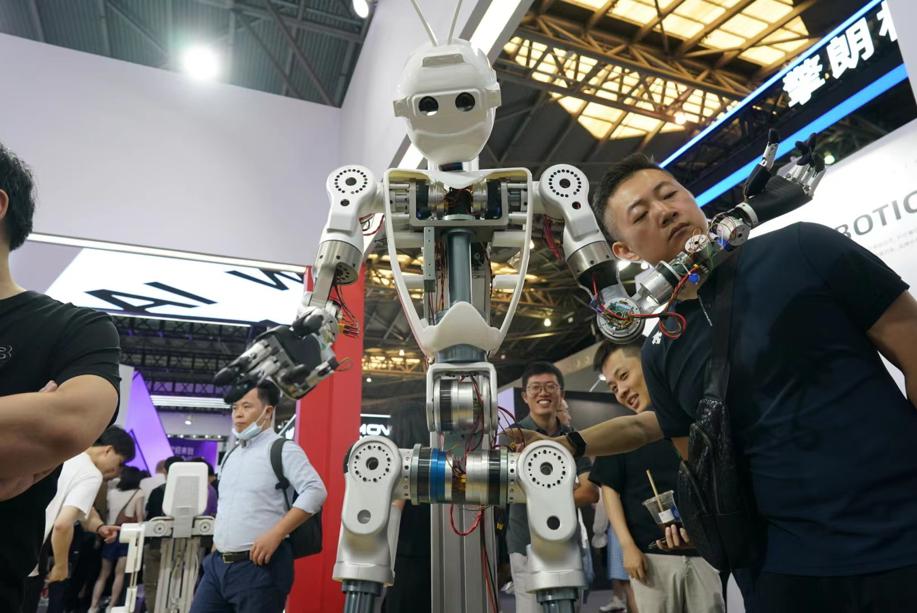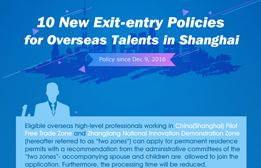Future of AI takes centerstage at WAIC 2023

The WAIC 2023 showcases AI achievements at the Shanghai Expo Center. [Photo by Gao Erqiang/chinadaily.com.cn]
Themed "Intelligent Connectivity, Generating Future" and focused on large models and AIGC (AI-Generated Content), the 2023 World Artificial Intelligence Conference (WAIC 2023) in Shanghai offered important insights into the future development of AI technology.
Held from July 6 to 8, the event was attended by top scientists, entrepreneurs, government officials, and industry experts from across the globe who discussed AI-powered high-quality development and matters related to the modern industrial system.
Considered the most high-profile AI event in Shanghai, the conference comprised various forums and discussions about core technologies, intelligent terminals, application empowerment, and cutting-edge technology.
Gathering the world's top AI leaders
Since its inaugural edition in 2018, the WAIC has always been viewed as a top-tier international event. The opening ceremony of WAIC 2023 featured speeches and discussions from some of the world's most prominent tech industry experts.
During his video address, Tesla CEO Elon Musk shared insights into general artificial intelligence and showcased his team's latest advancements in AI technology, including humanoid robots and autonomous driving.
Yann LeCun, the chief AI scientist of Meta AI's Facebook AI Research team and a Turing Award laureate, spoke with Yu Kai, the founder and CEO of Horizon Robotics, about AI ethics and governance. Yann emphasized the importance of open-source platforms in ensuring the safety and practicality of artificial intelligence.
Yao Qizhi, another Turing Award laureate and president of the Shanghai Institute for Advanced Studies, highlighted breakthroughs in AI theory and the future roadmap for technological advancements. He noted that enabling intelligent robots to develop various perception abilities, such as vision and hearing, and learn new skills autonomously in different environments, would be key to future development in this field.
Showcasing global latest AI achievements
Several groundbreaking AI achievements were also showcased during the WAIC.
For example, Professor Tang Xiaoou's team from the Chinese University of Hong Kong presented their recent research accomplishments.
The recipient of the Best Paper Award at the Conference on Computer Vision and Pattern Recognition (CVPR 2023), the team recently created CityNeRF, the world's first city-level 3D realistic model based on NeRF technology.
The conference also featured the unveiling of several major innovative achievements, such as the INTERN General Model System, Fudan University's Digital Twin Brain, Zhangjiang SUPERCITY, and Fourier General-purpose Humanoid Robot GR-1.
The event also saw the announcement of the SAIL (Super AI Leader) Award. This prestigious honor, which recognizes outstanding contributions in the field of AI, was conferred to China Commercial Aircraft, Huawei Cloud Computing, Qualcomm, JTZ Medicine, and the research team led by Zhang Yunwei from the University of Cambridge.
A stage for young AI stars
During the conference, Yang Zhilin, founder of Moonshot AI and assistant professor at Tsinghua University, shared his insights on innovation and the commercialization of large models. Highlighting the key challenges in this area, Yang emphasized the need for a systematic approach to address these issues.
Pan Xingang, assistant professor at Nanyang Technological University, discussed the expanding applications of AI and the promising future of his work in video and 3D content generation. His algorithms have the potential to greatly enhance the quality and efficiency of content creation for designers, artists, animators, and visual effects artists.
Yuan Yang, assistant professor at Tsinghua University, explored the practical application of large models and emphasized the importance of collecting data through modal completion for interdisciplinary research. His insights shed light into the core issues faced in deepening interdisciplinary fields.
Analysis of global AI trends
Discussions on the current development trends in AI, and the future direction of this rapidly evolving field were also held during the WAIC.
Shen Xiangyang, former executive vice president of Microsoft and a foreign academician of the National Academy of Engineering of the United States, along with Saifur Rahman, chairman and CEO of IEEE, engaged in a thought-provoking round-table dialogue on fostering technological cooperation in the AI era.
Esteemed guests including Hu Houkun, rotating chairman of Huawei, Hou Yang, global senior vice president of Microsoft and chairman and CEO of Microsoft Greater China, and Xu Li, chairman and CEO of SenseTime, shared their perspectives on the advancements of large models, the trajectory of AI industry development, and the transformative potential of AI.
The participants all agreed that there is an urgent need to collaborate and create a mutually beneficial AI ecosystem. This collaborative effort, they noted, should be aimed at fostering innovation and building a better AI industry development ecosystem.
Unveiled during the opening ceremony of the WAIC, the Large Model Corpus Data Alliance, the Large Model Testing, Verification and Collaborative Innovation Center, and the Shanghai China Mobile Digital Transformation Industry Fund are expected to help develop a robust AI industry in Shanghai by facilitating data sharing, promoting collaborative innovation, and funding digital transformation endeavors.
Global collab in AI
The WAIC not only addressed the global concerns about the future of artificial intelligence but also emphasized the need for cooperation.
The event marked the launch of the UNIDO Global Alliance of Industrial and Manufacturing Artificial Intelligence and the UNIDO International Center of Excellence for Industrial and Manufacturing Artificial Intelligence Development.
These two initiatives are aimed at promoting international AI cooperation and contributing to the development of next-generation AI technologies that can improve human civilization.

 Print
Print Mail
Mail




